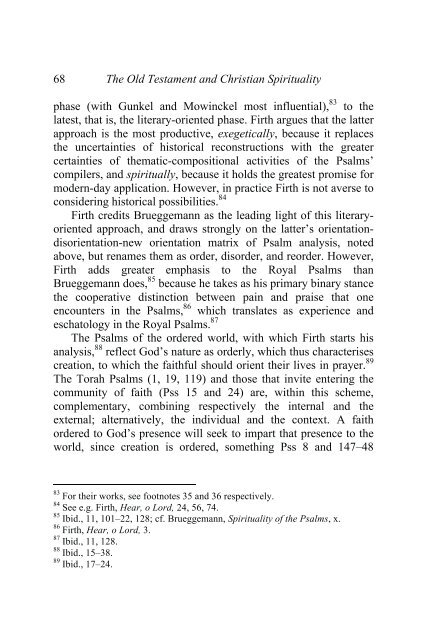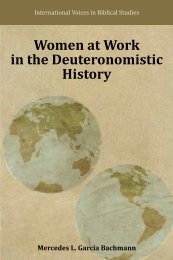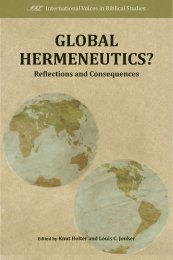The Old Testament and Christian Spirituality - International Voices in ...
The Old Testament and Christian Spirituality - International Voices in ...
The Old Testament and Christian Spirituality - International Voices in ...
Create successful ePaper yourself
Turn your PDF publications into a flip-book with our unique Google optimized e-Paper software.
68 <strong>The</strong> <strong>Old</strong> <strong>Testament</strong> <strong>and</strong> <strong>Christian</strong> <strong>Spirituality</strong><br />
phase (with Gunkel <strong>and</strong> Mow<strong>in</strong>ckel most <strong>in</strong>fluential), 83 to the<br />
latest, that is, the literary-oriented phase. Firth argues that the latter<br />
approach is the most productive, exegetically, because it replaces<br />
the uncerta<strong>in</strong>ties of historical reconstructions with the greater<br />
certa<strong>in</strong>ties of thematic-compositional activities of the Psalms’<br />
compilers, <strong>and</strong> spiritually, because it holds the greatest promise for<br />
modern-day application. However, <strong>in</strong> practice Firth is not averse to<br />
consider<strong>in</strong>g historical possibilities. 84<br />
Firth credits Brueggemann as the lead<strong>in</strong>g light of this literaryoriented<br />
approach, <strong>and</strong> draws strongly on the latter’s orientationdisorientation-new<br />
orientation matrix of Psalm analysis, noted<br />
above, but renames them as order, disorder, <strong>and</strong> reorder. However,<br />
Firth adds greater emphasis to the Royal Psalms than<br />
Brueggemann does, 85 because he takes as his primary b<strong>in</strong>ary stance<br />
the cooperative dist<strong>in</strong>ction between pa<strong>in</strong> <strong>and</strong> praise that one<br />
encounters <strong>in</strong> the Psalms, 86 which translates as experience <strong>and</strong><br />
eschatology <strong>in</strong> the Royal Psalms. 87<br />
<strong>The</strong> Psalms of the ordered world, with which Firth starts his<br />
analysis, 88 reflect God’s nature as orderly, which thus characterises<br />
creation, to which the faithful should orient their lives <strong>in</strong> prayer. 89<br />
<strong>The</strong> Torah Psalms (1, 19, 119) <strong>and</strong> those that <strong>in</strong>vite enter<strong>in</strong>g the<br />
community of faith (Pss 15 <strong>and</strong> 24) are, with<strong>in</strong> this scheme,<br />
complementary, comb<strong>in</strong><strong>in</strong>g respectively the <strong>in</strong>ternal <strong>and</strong> the<br />
external; alternatively, the <strong>in</strong>dividual <strong>and</strong> the context. A faith<br />
ordered to God’s presence will seek to impart that presence to the<br />
world, s<strong>in</strong>ce creation is ordered, someth<strong>in</strong>g Pss 8 <strong>and</strong> 147–48<br />
83 For their works, see footnotes 35 <strong>and</strong> 36 respectively.<br />
84 See e.g. Firth, Hear, o Lord, 24, 56, 74.<br />
85 Ibid., 11, 101–22, 128; cf. Brueggemann, <strong>Spirituality</strong> of the Psalms, x.<br />
86 Firth, Hear, o Lord, 3.<br />
87 Ibid., 11, 128.<br />
88 Ibid., 15–38.<br />
89 Ibid., 17–24.




